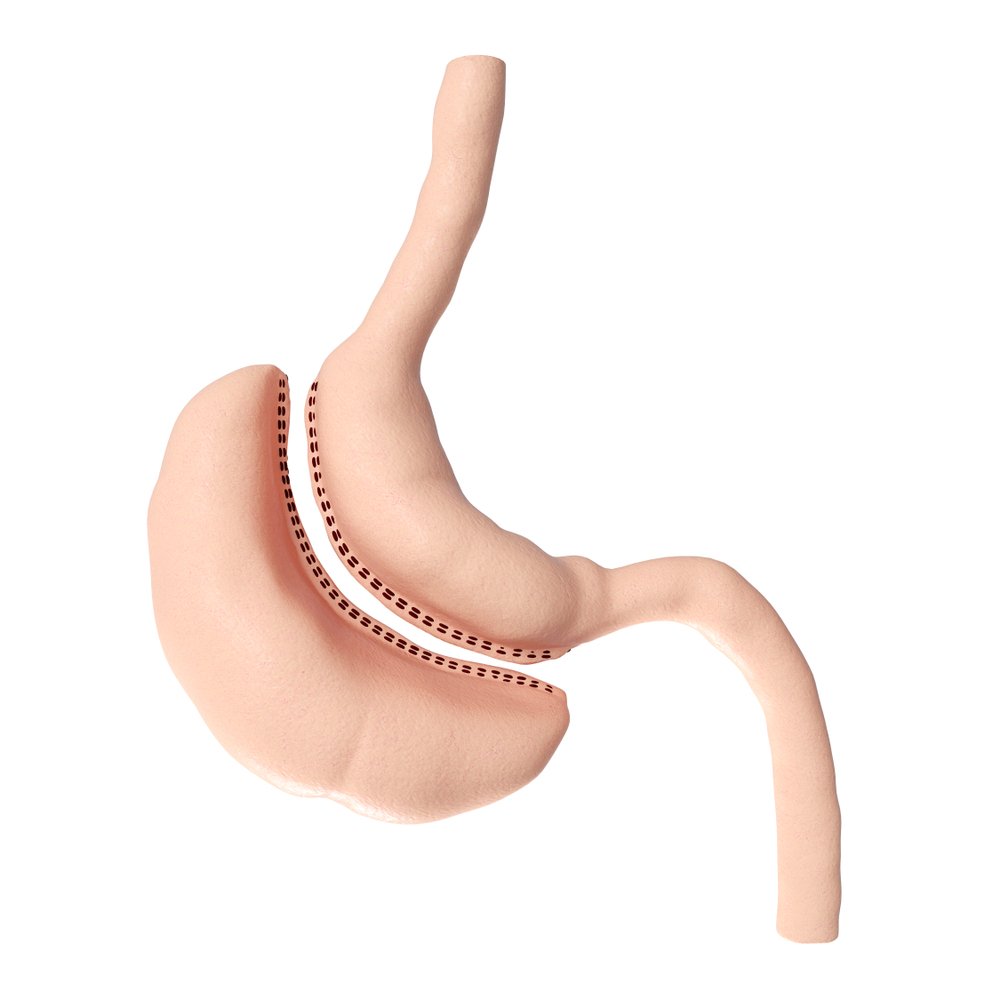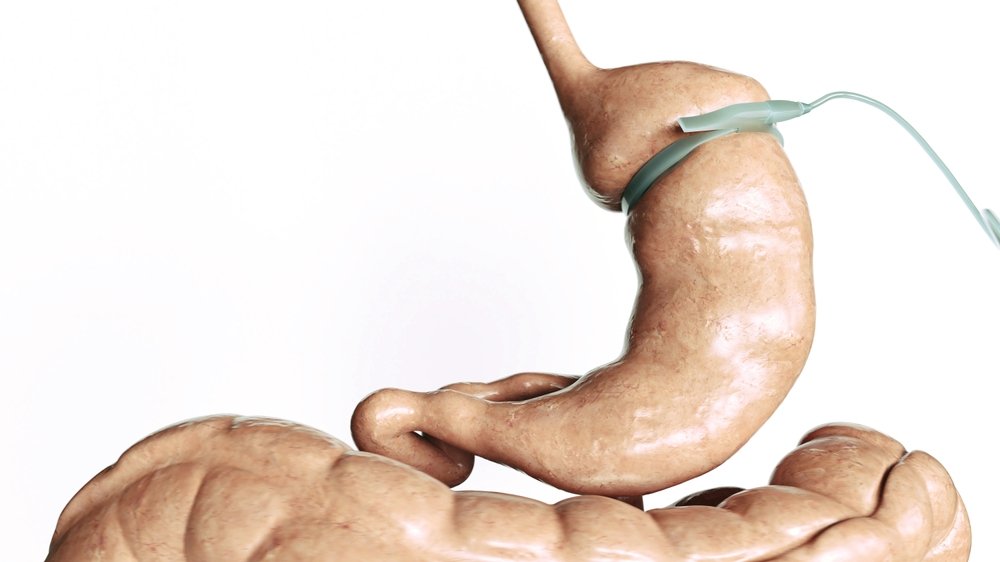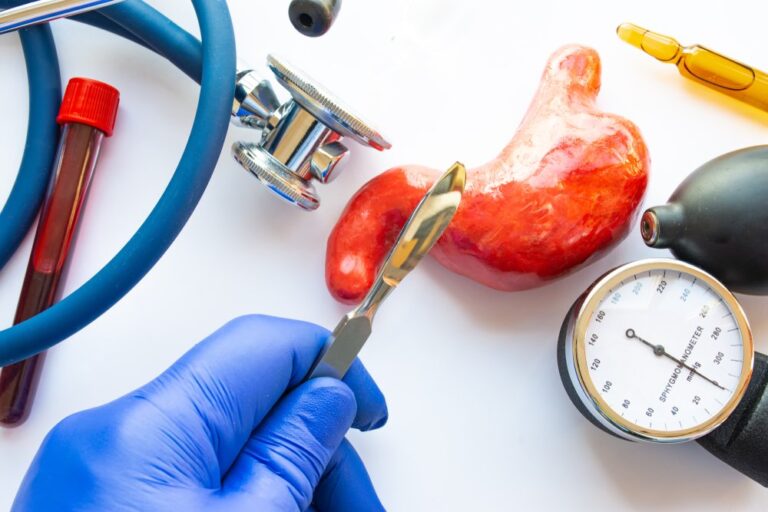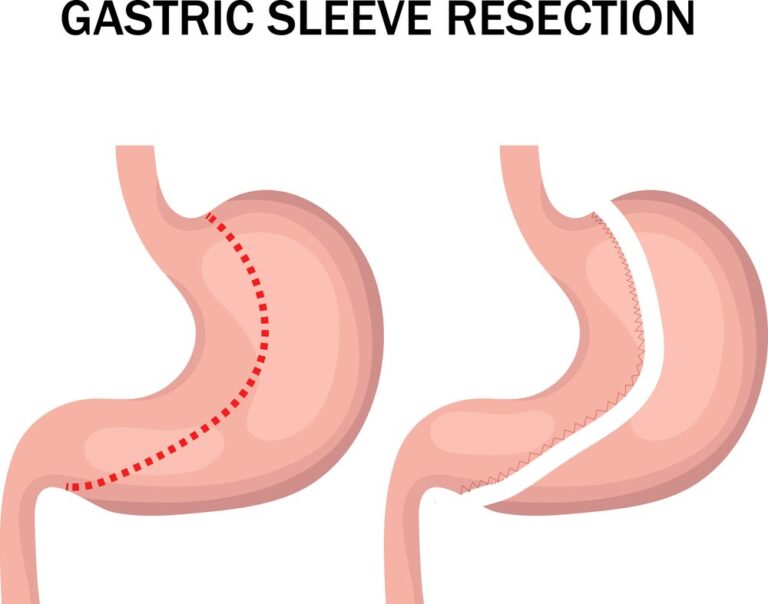A twisted stomach, also known as gastric volvulus, is a rare but possible complication that can occur after gastric sleeve surgery. While relatively uncommon, it involves the twisting or rotation of the stomach, leading to symptoms like severe abdominal pain, nausea, vomiting, and difficulty eating or drinking. If you experience these symptoms, it’s crucial to seek immediate medical attention.
Diagnostic tests, such as imaging studies or endoscopy, may be performed to confirm the diagnosis. Treatment typically involves surgical intervention to untwist the stomach and address any associated complications. While the overall risk is low, it’s important to follow post-operative instructions, attend follow-up appointments, and promptly report any concerning symptoms to your healthcare provider.
Get a $1000 Off on Gastric Sleeve in Miami
Identifying a Twisted Stomach After Gastric Sleeve Surgery
After undergoing gastric sleeve surgery, it is crucial to be able to recognize potential complications that may arise. One such complication is a twisted stomach, also known as gastric volvulus. This condition occurs when the stomach twists, leading to the obstruction of food and fluid passage. In this article, we will delve into the causes, symptoms, and methods for identifying and treating a twisted stomach after gastric sleeve surgery.

Twisted Stomach: Causes and Symptoms
A twisted stomach occurs when the stomach undergoes abnormal rotation or twisting, resulting in a partial or complete obstruction of blood supply and the passage of food. This condition can be life-threatening if not promptly diagnosed and treated.
Common Causes
Several factors can contribute to the development of a twisted stomach. Some common causes include congenital abnormalities of the stomach, weak connective tissues, adhesions from previous surgeries, diaphragmatic hernias, and anatomical variations.
Symptoms
The symptoms of a twisted stomach may vary depending on the severity and duration of the condition. Common signs include severe abdominal pain, bloating, nausea, vomiting, difficulty in passing gas, or experiencing difficulties with bowel movements.
Risk Factors and Causes for a Twisted Stomach Post-Surgery
After undergoing gastric sleeve surgery, it is important to be aware of the risk factors and potential causes that can lead to a twisted stomach, also known as gastric volvulus. Understanding these factors can help individuals identify the warning signs and seek prompt medical attention. Here are some key risk factors and causes associated with a twisted stomach after gastric sleeve surgery:
- Anatomical Factors: Certain anatomical variations or abnormalities can increase the risk of a twisted stomach. For example, having a naturally loose or mobile stomach can make it more susceptible to twisting.
- Connective Tissue Weakness: Weak connective tissues, such as those caused by genetic factors or prior surgeries, can contribute to the development of a twisted stomach. These weakened tissues may not provide sufficient support to keep the stomach in its proper position, making it more prone to twisting.
- Adhesions: Adhesions are bands of scar tissue that can form after abdominal surgeries, including gastric sleeve surgery. If these adhesions develop around the stomach, they can restrict its movement and increase the likelihood of twisting.
- Diaphragmatic Hernias: A diaphragmatic hernia is a condition where organs from the abdominal cavity protrude into the chest through an opening in the diaphragm. This herniation can disrupt the normal position of the stomach and contribute to its twisting.
- Surgical Technique and Complications: The surgical technique used during gastric sleeve surgery can play a role in the occurrence of a twisted stomach. Improper suturing or stapling of the stomach may increase the risk of twisting. Additionally, complications such as leaks from staple lines can weaken the stomach tissue and make it more susceptible to twisting.
- Excessive Scar Tissue Formation: Excessive scar tissue formation, known as fibrosis, can occur after gastric sleeve surgery. This can cause the stomach to become adhered to surrounding tissues, limiting its mobility and potentially leading to twisting.
- Postoperative Adverse Events: Complications that arise during the postoperative period, such as excessive vomiting or severe abdominal distension, can increase the risk of a twisted stomach. These events can exert pressure on the stomach and disrupt its normal position, potentially resulting in twisting.

It is important to note that while these factors and causes increase the risk of a twisted stomach after gastric sleeve surgery, not all individuals with these risk factors will experience this complication. It is crucial to consult with a healthcare professional for an accurate diagnosis and appropriate management if any symptoms or concerns arise.
Get a $1500 Off on Gastric Bypass Surgery Miami
Addressing a Twisted Stomach Post-Gastric Sleeve Surgery
If you have undergone gastric sleeve surgery and suspect a twisted stomach, also known as gastric volvulus, it is crucial to take immediate action. Timely recognition and appropriate management are vital to prevent further complications. Here are the steps to address a twisted stomach post-gastric sleeve surgery:
| Addressing a Twisted Stomach Post-Gastric Sleeve Surgery |
|---|
| 1. Recognize the Symptoms |
| 2. Contact Your Healthcare Provider |
| 3. Diagnostic Evaluation |
| 4. Nonsurgical Interventions |
| 5. Surgical Interventions |
| 6. Recovery and Aftercare |
| 7. Emotional and Psychological Support |
Preventing Complications After Gastric Sleeve Surgery
Gastric sleeve surgery is a significant step towards achieving weight loss and improving overall health. To ensure a successful outcome and minimize the risk of complications, it is essential to take proactive measures during the recovery period. Here are some effective strategies for preventing complications after gastric sleeve surgery:
- Follow Postoperative Guidelines: Adhere strictly to the postoperative guidelines provided by your healthcare team. These guidelines may include dietary recommendations, activity restrictions, and instructions for wound care. Following these guidelines promotes proper healing and reduces the risk of complications.
- Gradual Transition to Solid Foods: Gradually progress from a liquid diet to a soft food diet and eventually to solid foods as advised by your healthcare provider. Rushing this process can strain the newly formed stomach and lead to discomfort or complications. Take small, frequent meals and chew food thoroughly to aid digestion.
- Stay Hydrated: Proper hydration is essential for postoperative recovery. Drink adequate amounts of water throughout the day to prevent dehydration. Avoid drinking fluids with meals to prevent overfilling the stomach. Sip fluids between meals to stay hydrated.
- Mindful Eating: Adopt mindful eating habits to avoid overeating and straining the stomach. Eat slowly, savor each bite, and stop eating when you feel comfortably full. Avoid distractions while eating, such as television or electronic devices, as they can lead to mindless eating.
- Regular Exercise: Engage in regular physical activity as recommended by your healthcare provider. Regular exercise helps maintain muscle tone, supports weight loss, and improves overall well-being. Start with gentle activities, such as walking, and gradually increase intensity and duration over time.
- Vitamin and Mineral Supplementation: Gastric sleeve surgery can affect nutrient absorption, leading to potential deficiencies. Take prescribed vitamin and mineral supplements regularly to meet your body’s nutritional requirements. Regular blood tests can help monitor nutrient levels and guide supplementation.
- Attend Follow-up Appointments: Regularly attend scheduled follow-up appointments with your healthcare provider. These visits allow for monitoring of your progress, early detection of any potential issues, and adjustment of medications or treatment plans if necessary.
- Manage Stress and Emotional Well-being: Addressing emotional well-being is essential after surgery. Seek support from family, friends, or support groups to cope with any emotional challenges. Engage in stress-reducing activities such as meditation, deep breathing exercises, or engaging in hobbies you enjoy.
- Educate Yourself: Stay informed about your surgery, its potential complications, and the signs and symptoms to watch out for. Knowledge empowers you to identify and address potential issues promptly.
- Communicate with Your Healthcare Team: Maintain open and regular communication with your healthcare team. Report any unusual symptoms, concerns, or changes in your health. They are there to support and guide you throughout your recovery journey.
By following these preventive measures, you can reduce the risk of complications and optimize your results after gastric sleeve surgery. Remember, each individual’s recovery is unique, so consult with your healthcare provider for personalized advice and guidance.

Healthy Lifestyle Changes to Prevent a Twisted Stomach
Adopting a healthy lifestyle is crucial in preventing various gastrointestinal complications, including a twisted stomach. By making proactive changes to your lifestyle, you can reduce the risk of this condition and promote overall digestive health. Here are some healthy lifestyle changes to consider:
- Maintain a Healthy Weight: Achieve and maintain a healthy weight through a balanced diet and regular exercise. Excess weight can put strain on the stomach and increase the risk of complications, including a twisted stomach. Consult a healthcare professional for personalized weight management guidance.
- Follow a Nutritious Diet: Consume a well-balanced diet that includes plenty of fruits, vegetables, whole grains, lean proteins, and healthy fats. Avoid excessive consumption of processed foods, sugary beverages, and high-fat foods. Adequate fiber intake can also promote healthy digestion and prevent complications.
- Practice Portion Control: Be mindful of portion sizes and avoid overeating. Eat smaller, more frequent meals throughout the day to prevent excessive stretching of the stomach. Chew food thoroughly and eat slowly to aid digestion and prevent discomfort.
- Stay Hydrated: Drink an adequate amount of water throughout the day to stay hydrated. Proper hydration supports healthy digestion and helps prevent complications. Limit the intake of carbonated and sugary beverages as they can contribute to bloating and discomfort.
- Engage in Regular Physical Activity: Incorporate regular exercise into your routine to promote overall health and maintain a healthy weight. Engaging in activities such as walking, jogging, swimming, or cycling can support healthy digestion and prevent gastrointestinal complications.
- Manage Stress: Chronic stress can impact digestive health. Practice stress management techniques such as deep breathing exercises, meditation, yoga, or engaging in hobbies that promote relaxation. Prioritize self-care and take time to unwind.
- Avoid Straining During Bowel Movements: Straining during bowel movements can put pressure on the abdominal area and potentially contribute to complications. Ensure you have a diet rich in fiber, stay hydrated, and establish regular bowel habits to prevent constipation and the need for straining.
- Quit Smoking: If you smoke, consider quitting. Smoking can impair the function of the digestive system, increase the risk of complications, and hinder the healing process. Seek support from healthcare professionals or support groups to quit smoking successfully.
- Practice Good Posture: Maintain good posture while sitting and standing to support healthy digestion. Avoid slouching, as it can compress the abdominal area and potentially affect the position of the stomach.
- Attend Regular Check-ups: Regularly visit your healthcare provider for routine check-ups and screenings. This allows for early detection and management of any underlying conditions that may increase the risk of complications.
By incorporating these healthy lifestyle changes, you can promote optimal digestive health and reduce the risk of complications such as a twisted stomach. Remember to consult with your healthcare provider for personalized advice and guidance based on your specific needs and medical history.






